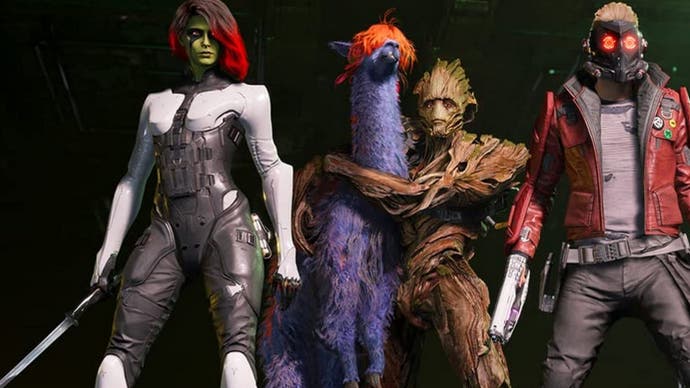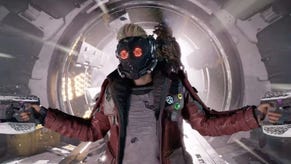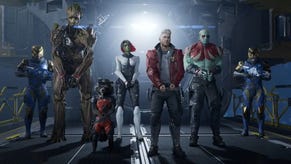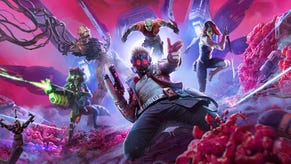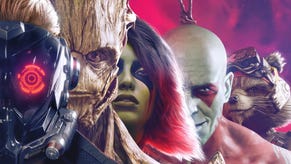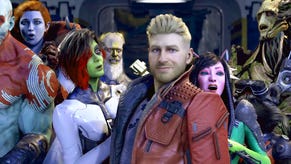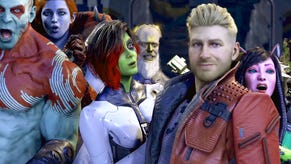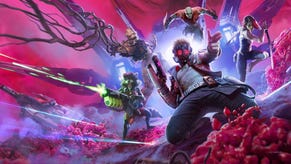How Eidos-Montréal's accessibility department works to make games for everyone
Guardians of accessibility.
When Shadow of the Tomb Raider released in 2018, it was at the forefront of many aspects of accessibility, showcasing how to do subtitles right and offering an in-depth variety of gameplay options. The studio's latest release, this year's Guardians of the Galaxy, once again offers a lot of options specific to the game, and so I took the opportunity to talk to Améliane F. Chiasson, Eidos-Montréal's accessibility lead. (She works with a colleague, Rodrigo Sanchez.)
In the gaming industry, accessibility lead, or chief accessibility officer, is still a fairly new job title. Accessibility officers work in different ways to make a company's products, and ultimately the company itself, more accessible. Chiasson's appointment, she tells me, is fairly recent, as the department has only existed since 2020. For Eidos-Montréal, it was a way to formalise a job Chiasson had been doing for years, when she was still working in QA and user research.
"My own interest in the topic, mixed with my own needs and working with players with disabilities made me notice that accessibility is something the industry overall is lacking," she says. "It's just something the industry overall needs to catch up on. In the creation of new awards categories for the Game Awards and with media outlets talking about accessibility more, we see the topic is here to stay."
But Eidos-Montréal and other studios didn't just happen upon the idea of accessibility. Instead, it took championing by many people. "[For Eidos-Montréal] it was a team effort of various actors within the company," she says. "We came up with a pitch for the company to approve, with the help of our legal team, which was very knowledgeable about the CVAA, for example."
Chiasson explains the CVAA - the 21st Century Communications and Video Accessibility Act - to me: an act signed into law by President Obama in 2010, it ensures certain accessibility standards for modern communication services. Parts of the CVAA can affect game services like text and voice chat, so part of the business case for the department was to state that it could help with certain regulations the studio was already bound to by US law. Chiasson points out several times that she is very lucky to work in a company where accessibility is an established mindset, although she mentions the need for "frank conversations" on the topic with people to whom the concept may be entirely new.
"You'll see other companies who don't have a department yet who are still doing great strides in accessibility," Chiasson says. "And I think it's important to understand that even though we have a department which is composed by myself, there are a lot of different champions on the team on the different teams who are big advocates for accessibility, a lot of game designers, UX directors, UI artists, different people across departments who are really into accessibility. It is possible between such people to treat accessibility like a working group. The people who have the most weight on making a game accessible are the game designers themselves, and they need to be on the same page."
So far we have spent a lot of time talking about accessibility as a concept, but of course at some point these concepts have to be put into practice. "So obviously when it comes to accessibility, we always want to be there as early as possible. Accessibility isn't just a list of features that we want to slap on a menu," Chiasson explains. "In the conception and the early phases of a production we make the default experience as accessible and as consistent as possible to as many people as possible. That's actually a direct quote from [Ubisoft accessibility specialist] Cherry Rae Thompson, that you should make the core design and the core experience accessible."
Making the core experience accessible means to design a game that's already widely accessible without the need for additional options. Some players will of course need tools such as subtitles, but many accessibility tools don't need to be optional. In Guardians of the Galaxy, you find such design in at least two aspects - each button only controls one action, which makes it easier than pressing several buttons, for example when you have a motor disability, and the visor Star-Lord uses is designed with colour-blind-friendly colours, even though Chiasson is quick to admit there are also some parts of the game that aren't 100 percent suited to people with colour-blindness.
Guardians also tackles the issue of game difficulty by offering three standard difficulties and customisable difficulty options besides. While online discourse may have you believe that to make a game easier means a game designer must compromise their vision, Chiasson is firm that particularly in Guardians there is quite a bit that players can tweak without it constituting any sort of compromise. When I suggest that one of the hangups about accessibility may have to do with the idea that it's a compromise made for the sake of a minority, Chiasson tells me about the curb cut effect.
"Curb cuts were applied to sidewalks to make it easier for people with disabilities to get around, but now many people appreciate them because they help a lot of people besides," she says. "Accessibility in games is similar - it's a host of features that can help players to have enjoyable experiences, regardless of their disability or lack thereof."
Of course the ways in which players can tweak settings has limits - for Guardians of the Galaxy, one of these limits already became obvious when players weren't sure what it meant to tweak "deadzones" and such, running into a design language barrier despite the game's explanations for each setting. Chiasson's own regret is the lack of remappable controls - since the accessibility department was set up well into the development of Guardians, it was too late to implement the feature "without breaking lots of other things".
Ultimately, no game can be 100 percent accessible to all players - but Chiasson says that good planning can help make games more accessible than they are now. "You need to make sure that accessibility is part of your vocabulary, and that includes determining where there's going to be the most impact," Chiasson explains. "There is a work of prioritisation, that really sucks, but you have to go okay, we can't do that, but we can do this. Even then you have to have those conversations early, so that everyone can agree on what the scope will be. If you have these conversations, then you have to have the sort of unfortunate conversations about what can't be included less often."
But it's not only a select few people who have to hold all the accessibility knowledge. Eidos-Montréal works with consultants, like blind gamer and accessibility advocate Steve Saylor to deal with potential problems, as well as making sure they have a wide variety of playtesters from different backgrounds. Chiasson holds a variety of accessibility certificates, and she points out that just before the pandemic, many members of the Guardians dev team took the certification to become an AbleGamers Accessible Player Experience Practitioner.
"That really helped enforce the mindset," she says. "And it has to be a mindset, and a stance we take as an organisation. Difficulty and accessibility are an ongoing conversation that not everybody agrees on, but it's still an important conversation to have. At the end of the day people need to have the motivation at heart that everybody should play games, and we all deserve to have these experiences. I think that anybody with an ounce of emotion can get behind that."
